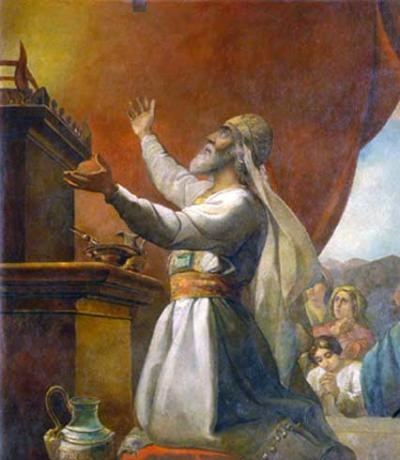
Saint of the Day for 1 July: St. Aaron
St. Aaron: Life, Biblical Role and Devotion to the Holy Prophet
Name
St. Aaron
Title
Brother of Moses
Birth
Egypt
Death
Mount Hor
Recurrence
July 1
Martyrology
2004 edition
Prayer
O God, who gave your people St. Aaron , with his help make us strong and persevering in the faith, to cooperate assiduously in the unity of the Church. Through our Lord Jesus Christ, your Son, who is God, and lives and reigns with you, in the unity of the Holy Spirit, for ever and ever. Amen
Roman Martyrology
Commemoration of St. Aaron, of the tribe of Levi, by his brother Moses anointed with the holy priestly oil of the Old Testament and buried on Mount Hor.
The Saint and Mission
Saint Aaron, a central figure in biblical tradition, is known for his role as high priest and collaborator of Moses in the mission to free the people of Israel from slavery in Egypt. Aaron was chosen by God to be Moses’ spokesman, given his eloquence and ability to communicate. This partnership was essential in conveying divine messages to Pharaoh and the people. Aaron played a critical role during the plagues of Egypt, using his staff to perform signs and miracles that demonstrated the power of God. His mission was to strengthen the faith of the Israelites and convince Pharaoh to free the people. After the exodus, Aaron was anointed as Israel’s first high priest, establishing a model of spiritual leadership that would last for generations. Aaron’s priesthood was not only a position of authority, but also of service and mediation between God and the people. He offered sacrifices, interceded for the sins of the people and maintained divine worship according to the prescriptions received from God. His mission was to guide the Israelites in faithfulness to God and in ritual purity, ensuring that their worship was pleasing to the Lord. Aaron, with his faith and dedication, demonstrated how spiritual leadership requires humility, obedience and a deep commitment to the service of God and others. His life and ministry remind us of the importance of priestly mediation and the role of spiritual leaders in guiding and supporting the community of faith.
The Saint and Mercy
Saint Aaron, brother of Moses and high priest, embodies divine mercy through his role as mediator between God and the people of Israel. His life is a continuing example of how mercy can manifest itself in spiritual guidance and priestly service. Aaron, chosen by God to be Moses’ spokesman, demonstrated great compassion in carrying out the mission of liberating the Israelites from slavery in Egypt. Aaron’s mercy is evident in his intercession for the people, especially during times of rebellion and sin. When the Israelites built the golden calf, Aaron, despite being involved in the error, joined Moses in interceding with God for the forgiveness of the people. This act of intercession shows his deep desire to see the people redeemed and at peace with God. As high priest, Aaron played the role of offering sacrifices for the people’s sins, an act that symbolized the ongoing need for reconciliation and forgiveness. His priestly function was a channel through which God’s mercy could flow to the Israelites, keeping hope and the possibility of redemption alive despite their transgressions. Aaron teaches us that mercy is not just a feeling, but a continuous action of mediation and service. His life reminds us of the importance of interceding for others and of being instruments of divine mercy, always seeking good and reconciliation. His legacy as high priest is a powerful reminder of the responsibility and compassion that every spiritual leader should embody.
Hagiography
Saint Aaron The older brother of Moses and Mary was born in Egypt to the Levite Amram, son of Caath, and Lochabed. He married Elizabeth, sister of Naasson, who was chief of the tribe of Judah. He had four sons: Nadab and Abihu who died without issue; Eleazar and Ithamar instead perpetuated the priesthood until the coming of Christ (who was a priest according to the much older order of Melchizedek, not of Aaron). With his younger brother (God in the Bible never chooses the firstborn) he led the Jews from Egypt to the Promised Land. He was eighty-three years old when the Lord designated him in the burning bush as the interpreter of Moses (who had difficulty expressing himself). Always with Moses he went to Pharaoh Rameses II to ask permission for the Jews to go on a three-day journey into the desert to celebrate a festival and …
